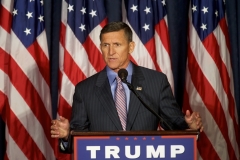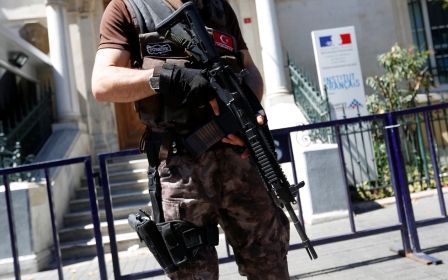Trump administration may extradite or detain Gulen, Turkey deputy PM says

Turkey is “very optimistic” that the forthcoming US administration will either detain or extradite Fetullah Gulen, the reclusive cleric Ankara accuses of masterminding the July coup attempt, a senior member of the Turkish government told the Middle East Eye.
Dr Numan Kurtulmus, deputy prime minister, said he expects “positive steps” from the incoming administration of US President-elect Donald Trump, including from national security adviser appointee Michael Flynn - who has already embraced Turkey's position - that may lead to the extradition of the cleric and to the US abandoning its support of the PYD Kurdish fighters in Northern Syria.
“I am personally very optimistic that they will choose to improve the relationship with Turkey. We expect positive steps from the new administration,” Kurtulmus said in an interview with the Middle East Eye during a visit to London.
“We expect the new administration of the United States either to detain him or extradite him to Turkey. We have given them legal evidence. We are hopeful, because they have the choice. Either they continue to keep Gulen as a leader of a terrorist coup plot in Pennsylvania, or they strengthen their relations with the Turkish people, 80 million of them. So the choice is for the American policymakers. We are optimistic that the new administration will choose the Turkish nation, rather than Fetullah Gulen himself,” the deputy premier said.
He said it was clear that US policy makers were using the Kurdish PYD as an instrument in a proxy war in the region.
“But it is a small group of people, let’s say between 5,000 and 10,000 fighters. On the other side there is a Turkish nation 80 million strong. And Turkey is the only Islamic country which has democracy, economic and political stability and historic relations with the European continent. I am personally very optimistic that they will choose to improve the relationship with Turkey. We expect positive steps from the new administration.”
Kurtulmus, who hails from the pro-Islamist wing of the Justice and Development Party (AKP) and is a former leader of the Islamist and center right HAS party, did not attempt to defend Trump’s views on Muslims.
He said, however, that he did not think Trump would change the multi-ethnic and multi-religious diversity of the US: “If they start some anti-Islamist activities, as an internal political instrument, it will effect the stability of society in the US. So I regard his statements as an attempt to consolidate nationalist forces inside the United States.”
Turkish forces are in a tense standoff with American-backed Kurdish PYD (Democratic Union Party) forces as they push farther south from the Turkish border to secure an area of about 5,000 square kilometres. A five-hour meeting with General Joe Dunford, chairman of the US Joint Chiefs of Staff, in Ankara earlier this month failed to produce a promised withdrawal of PYD forces from the Syrian city of Manbij to east of the Euphrates River.
Kurtulmus denied that Turkey had made a deal with Russia that allowed the continued aerial bombardment of east Aleppo, in which hundreds of civilians have died. The deputy premier said the only talks going on between Turkey and Russia were on the possibility of supplying humanitarian relief to civilians trapped in the war-torn city.
He said Turkey did not want to intervene in Mosul in Iraq. But he gave a clear warning that Ankara would not accept the replacement of the Islamic State (IS) group with what he called “other terrorist forces,” which he specified as Al-Hashed al-Shaabi, the mainly Shia Popular Mobilisation Forces (PMF) and the Kurdish PYD.
“Mosul must maintain its status as a multi-ethnic, multi-religious, and multi-sectarian city and the international community should observe the rights of all the different social segments of Mosul, otherwise it will become a focal point for imbalance and instability in Iraq,” Kurtulmus said.
The deputy prime minister, who is in charge of the media, denied that Turkey is cracking down on its free press, claiming that more than half of Turkey’s current media outlets were opposed to the government. Pressed by MEE about the case being pursued against Cumhurryiet, a Kemalist centre-left newspaper, he said that was a separate issue that had arisen from proceedings initiated within the media group.
Since the abortive coup, 39,274 people have been arrested, and 95,950 have been suspended from their jobs, according to the latest government figures. Of those arrested, about 7,000 have been released and 16,000 have got their jobs back. Of those detained, 2,263 are from Turkey’s judiciary. These include 102 judges from the higher civil courts, 42 judges from criminal courts, 2 Supreme Court judges and 3 from the Higher Commission of the Judicial System.
The deputy premier said the judiciary and the civil service had been so deeply infiltrated by Gulenists that it would take a couple of three-month terms of the current state of emergency to weed them out, but he was hopeful the emergency would end on 20 January.
The internal crackdown in Turkey has caused a deep rift with member states of the European Union, whose parliament recently made a non-binding decision calling for the end of EU accession talks with Ankara.
Turkey has threatened to end its agreement with the EU that had halted the flow of Syrian refugees into Europe.
The deputy prime minister accused European politicians of double standards, when Turkey all but “went over a cliff edge” during the coup attempt.
“After the July 15 coup attempt, we expected strong alliances with our European allies to show their solidarity to defend Turkish democracy, because Turkey is the only democratic country with an Islamic background. We have economic and political stability for the last 15 years. We have decent natural democracy in Turkey, although we have some new steps to be taken in the near future to create a more democratic atmosphere in Turkey.
“Unfortunately, very few of the European members showed their solidarity with the Turkish people and Turkish democracy. The British government was an exceptional case in defending Turkish democracy. So actually, it was a nightmare for the people of Turkey at that time. We nearly went over a cliff edge. We were expecting real support from Europe, but unfortunately we did not see it.”
He also accused the EU of not keeping its side of the bargain, when Turkey agreed to prevent Syrian refugees from crossing over to the Greek islands, by waiving visas for Turkish citizens. He said it was up to the EU to repair its relations with Ankara.
This article is available in French on Middle East Eye French edition.
Stay informed with MEE's newsletters
Sign up to get the latest alerts, insights and analysis, starting with Turkey Unpacked
Middle East Eye delivers independent and unrivalled coverage and analysis of the Middle East, North Africa and beyond. To learn more about republishing this content and the associated fees, please fill out this form. More about MEE can be found here.





